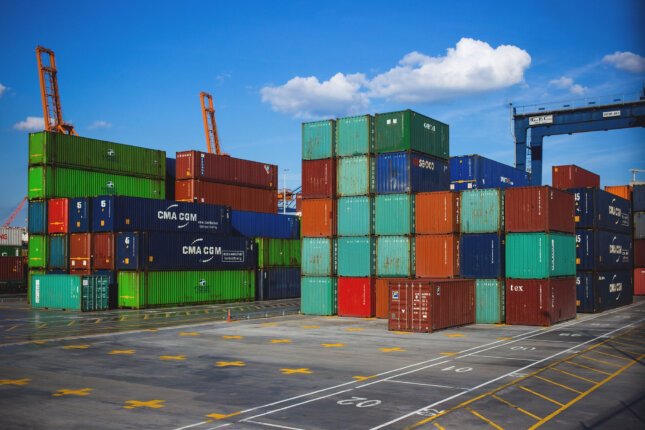KARACHI: Recent developments concerning proposed changes to Pakistan’s phytosanitary import conditions, particularly the exclusion of devitalization measures on imported goods and the proposal to establish the National Agri-Trade and Food Safety Authority (NAFSA), have sparked significant concern among farmers and exporters. Even before its formation, NAFSA’s policies have led to a 15% decline in rice exports due to the Department of Plant Protection’s (DPP) imprudent policies over the past four months.
Tahir Abbas, a customs officer holding position of Director General of DPP is reportedly under instruction from Ministry of National Food Security and Research (M/o NFS&R) to alter Pakistan’s current phytosanitary methyl bromide treatment for importable and exportable agriculture commodities with Aluminum phosphide (phosphine) exempting devitalization of importable goods after Methyl bromide monopoly controversy invented by some interest group, despite Pakistan’s phytosanitary import conditions well aligned with International Plant Protection Convention (IPPC), India, Australia, New Zealand etc., have alternative treatments i.e., Heat Treatment, Controlled Atmosphere Treatment and Irradiation Treatment and if DPP, M/o NFS&R and importers are interested to reduce methyl bromide use, they can promote and opt heat treatment, or controlled atmosphere treatment or irradiation to disinfest and devitalize agricultural products.
According to insiders, the food ministry and DPP intend to introduce such anti-farmer and anti-biosecurity changes in phytosanitary import conditions despite having IPPC approved alternatives (i.e., ISPM-15 & ISPM 42 for Heat Treatment, ISPM-44 for Controlled Atmosphere Treatment and ISPM-28 for Irradiation Treatment) in DPP current conditions and are equally effective for devitalization and disinfestation under pressure from the prime minister office by using shoulders of the members of 67th sub-committee of Agricultural Pesticides Technical Advisory Committee (sub-APTAC) as shield and saviour stamp on replaced import conditions to justify such unpardonable changes even against prime minister instruction that requires increase in number of importers for import of methyl bromide and reduce its consumption cost by introducing necessary amendments in Agricultural Pesticides Ordinance, 1971 (APO) and Agricultural Pesticides Rules, 1973 (APR) instead of abolishing globally as well as IPPC accepted Methyl bromide treatment for devitalization and disinfestation.
By 2017, DPP has one-liner the poorest phytosanitary conditions for import of all agricultural commodities i.e., the plant and plant products should be free from pests and disinfested with phosphine. However, Australia, India, New Zealand, USA, Russia, Mexico don’t accept phosphine treatment for import of agricultural goods in their countries due to development of resistance in it against stored grains pests including Khapra beetle species. Hence, DPP used to conduct methyl bromide treatment on exportable plant and plant products and food. Further, phosphine neither devitalizes the grains / seeds for consumption, plant pathogens, weed seeds, contaminants, nor as effective as methyl bromide with little exposure period nor as broad-spectrum as methyl bromide is.
Scores of invasive disparaging biosecurity risks – insects, plant pathogens, nematodes, weeds seeds and other contaminants (soil, plant debris, animal faeces) have been sneaked in, established and spread in Pakistan due to in-appropriate and weakest phytosanitary measures, even worse than African countries. Despite four time increase in pesticides import by Pakistan during the past two days i.e., from Rs 30 billion to Rs 135 billion in Pakistan, cotton production has been reduced three times i.e., from 14.5 million bales to 5.5 million bales and import of raw cotton bales has increased three times i.e., from 4 million bales to 12 million bales. If appropriate measures were in place to reduce entry of exotic pests in Pakistan, increase in crop production as well as huge foreign exchange spent on import of pesticides could have been saved because even huge import volume of pesticides failed to control growing foreign pest complex attack in agricultural, horticultural, floricultural crops and forests and during last year, the decline in the crop production of cotton (-29.6%), rice (-1.2%), sugarcane (-2.2%) and maize (-15.6%) due to foreign pests have been recorded.
It may be noted here that realising this vulnerable situation, the former government of Mian Nawaz Sharif instructed M/o NFS&R to develop and apply appropriate phytosanitary measures on imported commodities that are aligned with biosecurity sensitive nations to prevent further entry of invasive biosecurity risks in Pakistan and safeguard native agriculture and public health. Correspondingly, DPP synchronized Pakistan phytosanitary import conditions of importable agricultural commodities with National Plant Protection Organization (NPPO) of Australia, India and USA and ultimately, the government replaced obsolete Pakistan Plant Quarantine Rules, 1967, established in 1914 by British Indian Plant Protection Department with Pakistan Plant Quarantine Rules 2019. NPPO, India has replaced its phytosanitary import conditions in 2003 and Bangladesh in 2011. Pakistan was the last one to introduce changes in its plant quarantine regulations in 2019 exactly at par with USA, Australia, India, China, Russia, New Zealand, Brazil, Mexico.
Methyl bromide fumigation as one of the known, recognized and effective treatments to devitalize and disinfest the agricultural commodities in addition to Heat Treatment, Controlled Atmosphere Treatment and Irradiation Treatment is acceptable to every country under IPPC guidelines. Montreal Protocol has given it absolute exemption for its use as phytosanitary treatment for pre-shipment (exportable goods) and plant quarantine (importable goods) purpose putting restricting on its other uses i.e., soil treatment, structural treatment, fire extinguisher gas, refrigeration gas etc., after its establishment as ozone depletion substance due to lack of availability of cheap, effective, broad-spectrum, little exposure time alternate of methyl bromide and expecting alternate treatment as trade barrier even if banned had been imposed for pre-shipment and plant quarantine purpose. All biosecurity concerned nations have prescribed it as one of the options as phytosanitary treatment globally (e.g., Australia, India, New Zealand etc., has prescribed its treatment for devitalization and disinfestation of sunflower, corn, soybean, canola, pulses, rice etc.,). Further, it is acceptable to all contracting parties under IPPC guidelines.
Is There a Monopoly in Pesticides?
As far as monopoly of pesticides in Pakistan are concerned, currently, 89 pesticides that are registered in DPP and in excessive use of the farmers are experiencing sole monopoly in Pakistan being registered against only one importer and the farmers have to pay significant price against their purchase as desired by the importer than their import cost whereas, methyl bromide is registered against five importers and opened to register against any person that intends to import in Pakistan. Further, methyl bromide use are required by businessmen (importers and exporters not farmers) that can afford and prefer to conduct in Pakistan on arrival being four times expensive to conduct it in USA, Australia, New Zealand, Brazil and Argentina if they don’t manage to get their cargoes released without inspection and treatment. Further, it plays key role in safeguarding Pakistan’s biosecurity because as well as helps farmers by protecting domestic agriculture, public health and biosecurity of the country.
The pesticides that have sole monopoly in Pakistan and in great use of the farmers includes Gusathion-M, Belt, SIVANTO PRIME, Equip, Metasystox-R, Monceren, Emesto, Basagran, Neoron, Deltanet, Grasp, Easy Kill, Vitavax-200, Argold, Pay-Off, Calixin, Copper Blue, Digard, Kingbo, Commit, Karmex, Anthio, Authority, Rabicide, Mipcin, Ryzelan, Prevail, Kelion, MATOI, Tenikil, Upset, Tedion V-18, Bracon, Hound, Pyrilyl , X-Spore, TERRAD’ OR, Oncol-L, ZION, Jing Shou, XING GONG, Thirll, Overwatch, Mustang, Cadre, Roxy, Fury, Castra, Kanpai, Blow, Smash, Vectra, Jockey, Oberon, Laudis, Scout X-Tra, Fograt, Urlac, Basamid Granular , Delan, Assert, Sefina, Aztec, Diplo – M, Zokat, Deed, Matador, Fenocarb, Hilltop, Enrich, Everest 2.0, Evito, Moncut, Akofol, Diabolo, Fuji-One, Kelion, Chongsha, Matoi, Deltanet, Tecto, Brash, Degesch, Karathane Star, Pexalon, NEMASOL, Diacon II, Kuyifeng and UPRISER.
The dominance of these 89 pesticides in the market is a result of the existing regulatory framework under the APO and all past decisions since 90’s. No government since 90’s has taken any step to amend the concerned provisions (section 4 & 5) of APO and rule, 3, 4, and 9 of APR that protect monopoly in import of pesticides in Pakistan to break their monopoly despite this datum that these changes were indispensable in the interest of farmers and country. The monopoly of these pesticides even could not establish their identity as rescuer for the farmers to give rise increase in cotton, wheat, corn, rice, potato, citrus and mango yields except money minting by importers.
While diversifying sources can foster healthy competition and breaking monopolies, there are significant legal and procedural concerns surrounding the manner in which these changes are being pursued. According to SRO 1291(1)/2024, 23rd August 2024 read with Pakistan Plant Quarantine Rules, 2019 and Pakistan Plant Quarantine Act, 1971, such decisions fall under the purview, mandate and powers of National Biosecurity Technical Committee (NBTC), National Plant Health Committee (NPHC) and National Food Safety Technical Committee (NFSTC), as mandated by Pakistan Plant Quarantine Act, 1976 and APTAC is neither mandated nor empowered for such decision as unmistakeably provided by Rule 19 of APO. However, reports suggest that these committees have not been involved in the review of these phytosanitary import conditions by M/o NFS&R due to unavoidable pressure from prime minister office.
Stakeholders reaction:
The farmers associations of Punjab and Sindh urged respective authorities to abstain from introducing the proposed malafide changes and revisit the phytosanitary import conditions where necessary only through the appropriate channels (NBTC, NPHC & NFSTC) including former technical director generals of the DPP to ensure that any amendments serve the broader interests of the agriculture sector and national biosecurity.
Who Is Behind the Policy Shift?
On the instruction of Prime Minister Officer, which is allegedly being misled by the interest group, the new Director General of DPP and his subordinates, mostly unqualified and inexperienced, are working on the policy shift of pesticide treatment which may undermine the country’s exports of agriculture products.
The whole story/propaganda was reportedly created by Israr Khan, London based clearing agent and commercial fumigator having business ties with Indians, who previously attempted to make an unauthorised import of methyle bromide.
As per chats and voice messages, during a recent investigation, those behind the entire have been surfaced. The forensic analysis of mobile of Mr. Umar Farooq, Entomologist of DPP with Israr Khan saved as Noman Gujjar, Dr. Qasim Kakar, Director Admin posted in DPP on deputation from Balochistan Agriculture Research Institute, Quetta, Dr. Muhammad Basit, Umar Balagam, the largest Indentor of oil seeds in Pakistan, Haider, owner of Al-Abbas Agro Care Fumigation Company and front man of Israr Khan, Qasim Khan Kakar, Umar Farooq and Dr. Muhammad Basit saved as Jan Partner, Asif Choochi, Shehzad Arwa, Saifullah Guchli, Asif Nisa Shipping, Tariq Randhawa, Shehzad (Javed & Co), Rana Kalim Z, Sohail Ginger, Zulqarnain, clearing Agents has uncovered that Dr. Muhammad Basit, Umar Farooq, Dr. Qasim Khan Kakar, Israr Khan Kakar, Umar Balagam, Haider were master mind behind all malicious complaints, and well planned moves targeting three only senior technical officers of the DPP that are most experienced, trained and qualified officers in plant quarantine and food safety and plant protection in Pakistan to remove them from DPP and making methyl bromide fumigation controversial and substitute it with resistant Aluminum phosphide fumigant and occupy key posts in the DPP to put in place bribe collection system by facilitating customers (importer and exporter) by releasing their commodities without inspection and appropriate treatment without caring infestation in the goods and safety of Pakistan’s agriculture, public health and natural resources.
For this purpose, Mr. Umar Farooq used to advise Israr Khan how to talk, and push Rana Tanvir Hussain, federal minister, members of National Assembly Standing Committee and Senate Standing Committee on Ministry of National Food Security and Research, Mr. Waseem Ajmal Chaudhry, Secretary, Mr. Bilal Haider, Joint Secretary, Tahir Abbas, Dr. Muhammad Basit and Mr. Asad Rehman Gilani, Secretary to the prime minister by sending cooked up complaints against senior officials of the DPP attributing methyl bromide monopoly with them despite it was registered in DPP for fumigation before their joining the DPP and to replace it with aluminum phosphide even if insects are found, the cargo should not be devitalized and disinfested with due dose i.e., 80 g/cubic meter instead with under dose i.e., 32 g/cubic meter to benefit clearing agents and indentor in return of bribe. In response, Israr Khan used to share his texts and voice messages sent to Secretary, M/o NFS&R, Dr. Muhammad Basit, Qasim Khan Kakar etc., and their corresponding replies with Umar Farooq to claim his close relations with them as forensic analysis of Mr. Umar Farooq mobile exposed.
Even Farooq asked Israr Khan to push Dr. Basit for posting Umar Farooq as seaport in-charge for preparation of revised conditions and to put up the same to Secretary and in return Mr. Israr Khan exchanged Dr. Basit message with Mr. Umar Farooq that he okayed his recommendation. Dr. Muhammad Basit acted immediately exactly as dictated by Umar Farooq through Israr Khan and deputed Umer Farooq to prepare new conditions for replacement of methyl bromide treatment with phosphine treatment and same was submitted to Ministry. Forensic analysis of Umar Mobile openly divulged this collusiveness of these people.
Dr. Muhammad Basit, and Mr. Umar Farooq are already involved in release of infested soybean cargo in 2019 by accepting 16 million rupees bribe and FIA CCC, Karachi has registered FIR No. 4/2019 against them. They have also released two oil seed cargoes in July 2024 by accepting bribe by providing consultancy indentor Umar Balagam how to make invented and forged phytosanitary certificates, import permit, shipping documents, treatment documents as revealed by Umar Mobile. The same was also proved in departmental enquiry that triggered his transfer by Federal Minister. However, Israr Khan and Dr. Qasim Khan and Basra have managed his posting again at key post in DPP as mobile revealed. FIA has started investigation against Umar Farooq and his accomplices officials and clearing agents and indentors.

London Based Clearing Agent Israr Khan who allegedly shares this picture (with former caretaker PM Anwarul Haq Kakar, apparently during a london based event) to pressurize DPP officials

Dr. Muhammad Basit, Deputy Director, DPP

Umar Farooq, entomologist DPP




